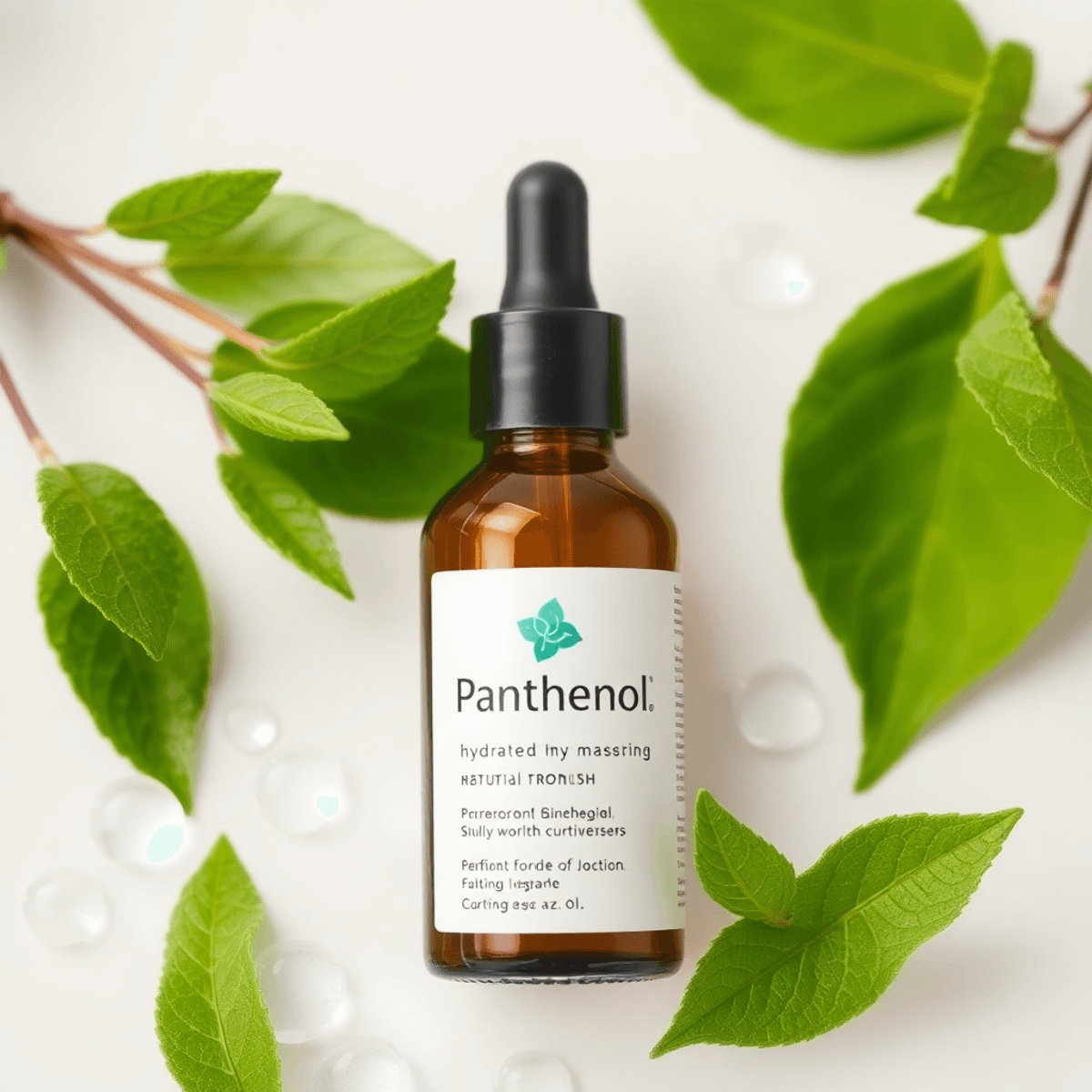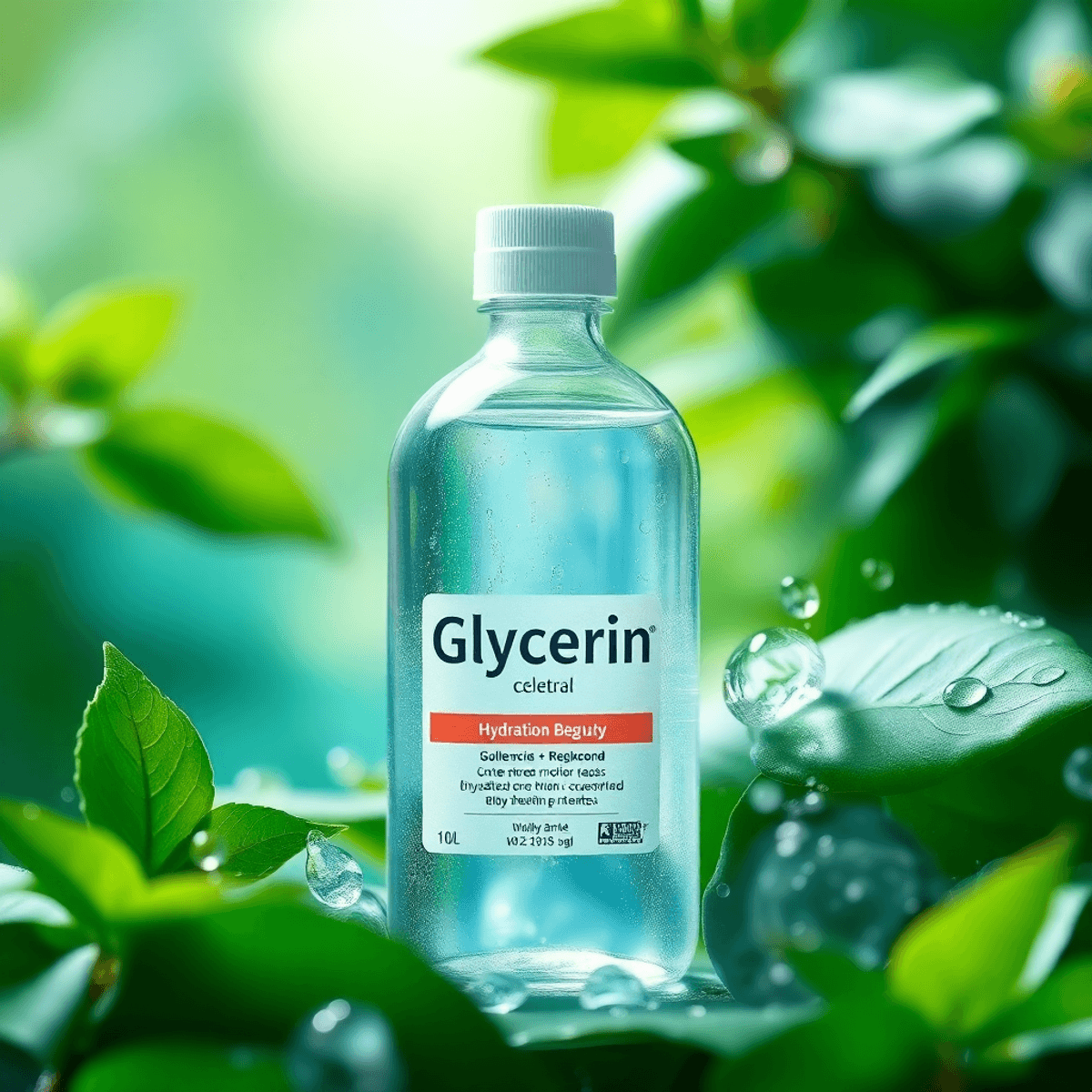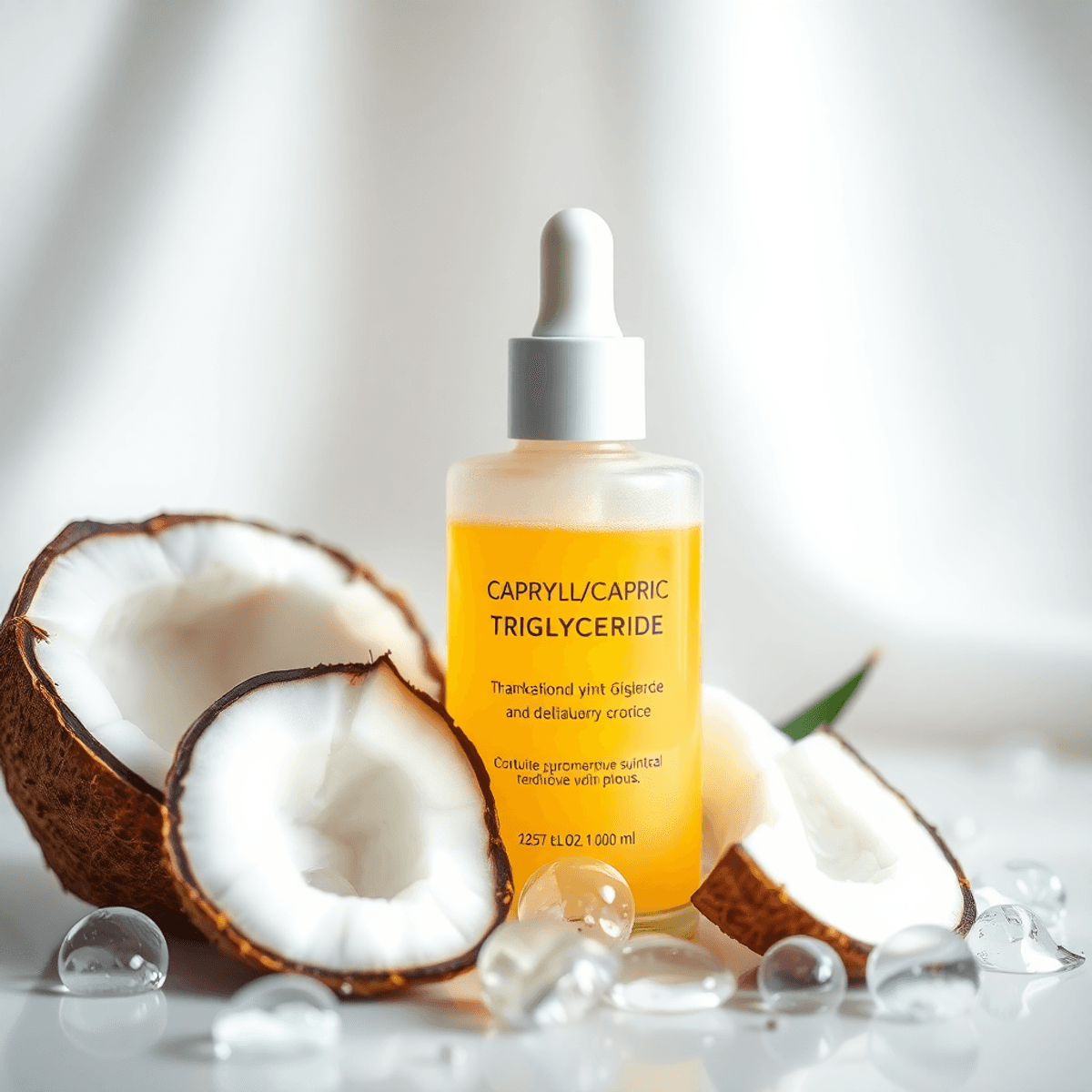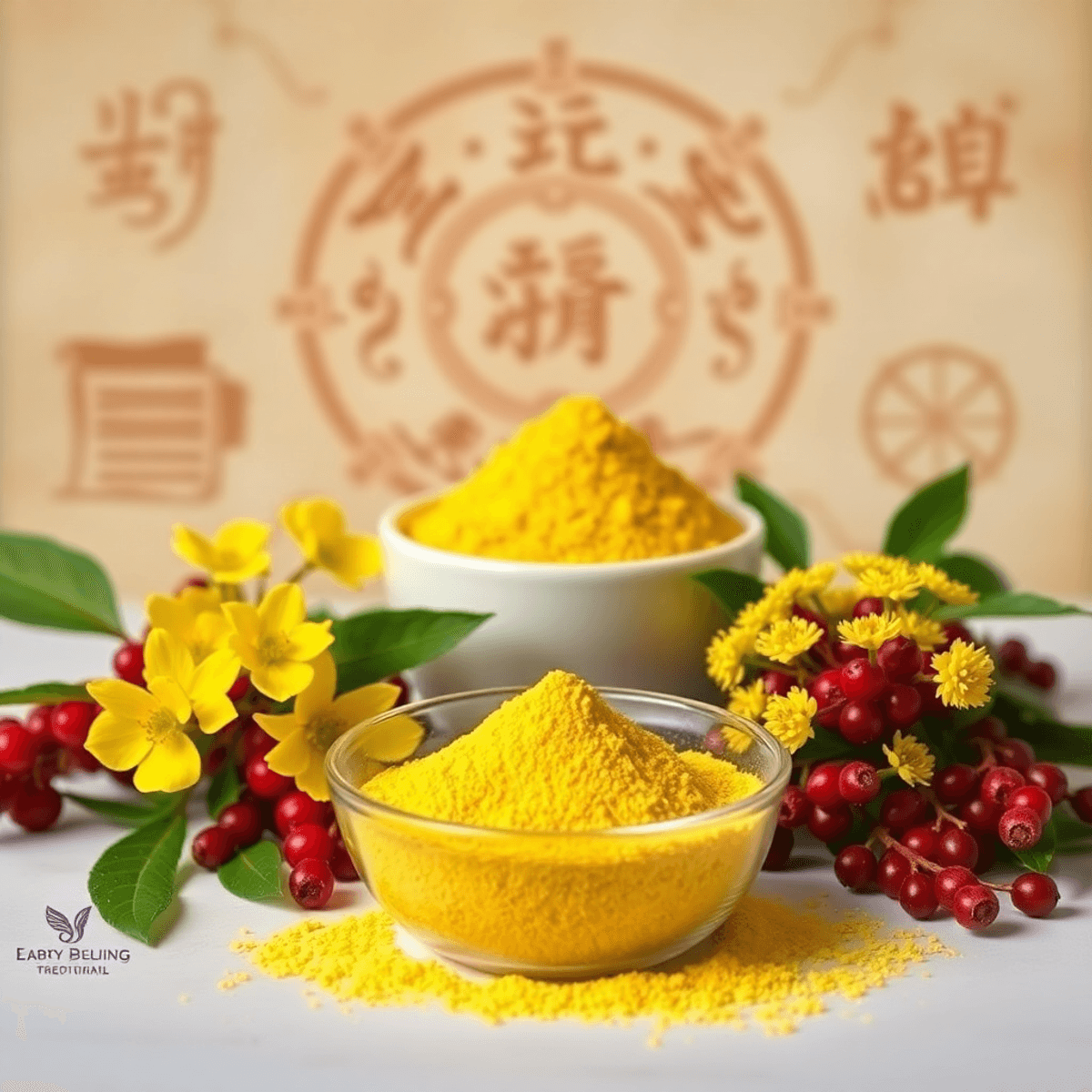Glycerin: The Secret Ingredient for Glowing Skin

Glycerin: The Secret Ingredient for Glowing Skin
Glycerin is a powerful ingredient found in many skincare products that can transform dull, dehydrated skin into a radiant masterpiece. This clear liquid has gained popularity among skincare enthusiasts and dermatologists, making it a staple in the beauty industry.
Why is hydration important for your skin?
Proper hydration is essential for maintaining healthy skin. It helps:
- Keep your skin elastic
- Prevent premature ageing
- Achieve a natural glow
Glycerin plays a crucial role in keeping your skin hydrated. It acts as a moisture magnet, attracting water to your skin cells.
What makes glycerin special?
Glycerin has several unique qualities that make it an effective skincare ingredient:
- Creates an invisible protective layer on your skin
- Pulls moisture from the air into your skin cells
- Works well with other skincare ingredients
- Suitable for all skin types, including sensitive skin
- Helps treat common skin conditions like eczema, such as atopic eczema and dermatitis
From basic cleansers to advanced anti-ageing serums, glycerin's versatility shines through its ability to enhance various skincare formulations. This humble ingredient proves particularly effective in addressing multiple skin concerns:
- Dry, flaky skin
- Uneven texture
- Dullness
- Loss of elasticity
- Environmental damage
Whether you're dealing with dry winter skin or striving for that coveted glass-like complexion, glycerin offers a dependable solution for achieving healthy, glowing skin.
What is Glycerin?
Glycerin, scientifically known as glycerol (C3H8O3), is a colourless, odourless liquid compound with remarkable moisturising properties. This natural alcohol contains three hydroxyl groups in its molecular structure, giving it the unique ability to attract and bind water molecules.
You'll find glycerin in two primary forms:
- Natural glycerin - derived from plant oils (coconut, soy, palm) through the soap-making process
- Synthetic glycerin - produced through chemical processes using petroleum-based materials
The versatility of glycerin extends beyond skin care. This powerful ingredient serves multiple industries:
- Pharmaceutical: Used in cough syrups and medical creams
- Food: Acts as a sweetener and preservative
- Cosmetics: Found in glycerin body wash, face moisturisers, and lip products
- Industrial: Used in antifreeze and lubricants
Its molecular structure makes glycerin an exceptional humectant in skincare formulations. When applied to your skin, it creates a protective layer that locks in moisture while remaining lightweight and non-greasy. This property makes glycerin-based moisturisers and body lotions particularly effective for maintaining skin hydration.
Benefits of Glycerin for Skin
Glycerin stands out as a powerhouse ingredient in skincare, offering multiple benefits that contribute to healthier, more radiant skin. Here's what this remarkable compound can do for your complexion:
1. Powerful Humectant Properties
Glycerin's most celebrated attribute lies in its exceptional ability to attract and bind moisture. As a humectant, it pulls water from both the environment and deeper skin layers to the surface. This dual-action hydration mechanism:
- Reduces surface dryness
- Plumps up skin cells
- Creates a smoother, softer texture
- Diminishes the appearance of fine lines
2. Skin Barrier Reinforcement
Your skin's protective barrier plays a crucial role in maintaining healthy skin. Glycerin strengthens this natural defence system by:
- Creating a protective film on the skin's surface
- Preventing moisture loss through transepidermal water loss (TEWL)
- Shielding against environmental pollutants
- Supporting the skin's natural lipid barrier
3. Advanced Wound Healing
Research shows glycerin accelerates the skin's natural healing process. This makes it particularly beneficial for:
- Treating minor cuts and scrapes
- Managing eczema flare-ups with products like our Eczema Body Wash
- Soothing psoriasis patches using our Eczema Cream
- Reducing inflammation and redness
The compound works by promoting cell turnover and supporting the skin's natural repair mechanisms, leading to faster recovery and reduced scarring.
4. Enhanced Product Effectiveness
Glycerin acts as a facilitator for other skincare ingredients, making your products work harder:
- Improves penetration of active ingredients
- Helps distribute products evenly across the skin
- Stabilises formulations in serums and creams
- Increases the bioavailability of other beneficial compounds
When combined with other active ingredients like vitamin C or retinol, glycerin helps create an optimal environment for these compounds to work effectively. Its presence in formulations ensures better product absorption and enhanced results from your skincare routine.
The versatility of glycerin makes it suitable for all skin types, from dry to oily. Whether you're using pure glycerin, veg glycerin, or glycerin-enriched products, these benefits can be experienced across the board.
Additionally, incorporating all-natural ingredients into your skincare routine can further enhance these benefits. For those struggling with conditions such as eczema or psoriasis, exploring our range of eczema treatment products at 1936 Original may provide much-needed relief and support your journey towards healthier skin.
Glycerin in Skincare Products
The skincare market offers various types of glycerin, each with distinct characteristics and benefits. Pure glycerin represents the most concentrated form, containing 99.7% glycerol. This potent humectant requires dilution before application to prevent potential skin irritation.
Vegetable glycerin, derived from plant oils like coconut, soy, or palm, stands out as a natural alternative. This variant appeals to consumers seeking organic, cruelty-free options. Vegetable glycerin maintains the same moisturising properties as pure glycerin while offering additional benefits:
- Sustainable sourcing
- Non-GMO options available
- Suitable for sensitive skin
- Compatible with vegan lifestyles
Popular glycerin-based products cater to different skin types and concerns:
Moisturisers
- Dry Skin: Look for rich creams with high glycerin content paired with occlusives
- Oily Skin: Choose lightweight, water-based formulations
- Combination Skin: Gel-cream hybrids work best
- Sensitive Skin: Products with minimal ingredients and vegetable glycerin
Cleansers
- Gentle Face Washes: Contains glycerin to prevent moisture loss during cleansing
- Cream Cleansers: Perfect for dry or mature skin
- Foaming Cleansers: Suitable for oily skin types
Targeted Treatments
- Serums: Glycerin enhances penetration of active ingredients
- Face Masks: Provides intense hydration
- Eye Creams: Helps reduce fine lines through hydration
The concentration of glycerin varies across products, typically ranging from 5% to 20%. Higher percentages don't necessarily mean better results - the optimal concentration depends on your skin type and the product's intended use.
When selecting glycerin-based products, consider your skin's specific needs. Dry skin benefits from higher concentrations in cream formulations, while oily skin responds better to lighter, water-based products with moderate glycerin levels.
For those interested in exploring more about natural health and skincare, 1936 Original offers a wealth of information and products that harness the healing power of nature.
How to Use Glycerin Safely in Your Skincare Routine
Using glycerin effectively requires proper dilution and careful application to achieve optimal results. Here's your guide to safely incorporating glycerin into your skincare routine:
Creating the Perfect Glycerin Mixture
The ideal ratio for mixing glycerin is:
- 1 part glycerin
- 3 parts water or rosewater
Popular Mixing Options:
- Glycerin + Rosewater: Creates a hydrating facial mist
- Glycerin + Hyaluronic Acid: Delivers deep hydration
- Glycerin + Aloe Vera: Soothes and moisturises sensitive skin
- Glycerin + Vitamin E: Provides antioxidant benefits
Pro tip: Store your glycerin mixture in a dark glass bottle to maintain its efficacy.
Application Guidelines
- Cleanse your face thoroughly
- Apply your glycerin mixture to damp skin
- Layer additional skincare products as needed
- Use twice daily for best results
Patch Testing Protocol
Before applying glycerin to your face, conduct a 24-hour patch test:
- Mix your glycerin solution
- Apply a small amount behind your ear
- Wait 24 hours
- Monitor for:
- Redness
- Itching
- Burning sensation
- Skin irritation
Warning Signs: If you experience any adverse reactions during the patch test, discontinue use immediately and consult a dermatologist.
Remember to maintain consistent humidity levels in your environment when using glycerin-based products. A humidifier can help create optimal conditions for glycerin to work effectively.
Potential Drawbacks and Considerations When Using Glycerin on the Skin
Understanding the potential risks of glycerin helps you make informed decisions about its use in your skincare routine. Here are key considerations to keep in mind:
The Humidity Factor
Low-humidity environments create a significant risk when using glycerin-based products. In dry conditions, undiluted glycerin can act as a reverse humectant, pulling moisture from the deeper skin layers rather than the atmosphere. This process leads to:
- Increased skin dehydration
- Tightness and discomfort
- Compromised skin barrier
- Potential irritation
Allergic Reactions
While glycerin allergies are rare, some users experience adverse reactions. Watch for these symptoms:
- Redness or skin flushing
- Itching or burning sensation
- Rash or hives
- Swelling around application area
Signs of Glycerin Sensitivity
- Immediate skin irritation
- Persistent dryness
- Breakouts in unusual areas
- Stinging sensation upon application
The best glycerin for skin use comes from vegetable sources and maintains proper dilution levels. Pure glycerin oil for skin application requires careful consideration of your local climate and individual skin sensitivity. Users in dry climates should opt for pre-formulated products rather than pure glycerin to minimise dehydration risks.
Final Thoughts on Incorporating Glycerin into Your Skincare Routine for Healthy Glowing Skin
Glycerin is a powerful ingredient in your quest for radiant skin. Its ability to attract and lock in moisture makes it an essential part of any effective skincare routine. By adding glycerin-based products to your daily regimen, you're not just adding another step—you're investing in your skin's long-term health.
Key strategies for success with glycerin:
- Start with properly diluted formulations
- Use it consistently in your daily routine
- Pair it with complementary ingredients like rosewater
- Listen to your skin's response and adjust accordingly
The path to glowing skin doesn't require complicated routines or expensive products. Glycerin's simplicity and effectiveness make it an accessible option for anyone seeking improved skin health. Whether you choose a glycerin-enriched moisturiser or create your own DIY mixture, this humble ingredient can transform your skin's appearance through proper hydration.
Remember: healthy, glowing skin starts with consistent care and the right ingredients—glycerin might just be the missing piece in your skincare puzzle.
FAQs
Why is hydration important for your skin?
Proper hydration is essential for maintaining healthy skin, as it helps to keep the skin barrier intact, prevents dryness, and promotes a radiant complexion.
What makes glycerin special?
Glycerin has several unique qualities, such as its powerful humectant properties, ability to reinforce the skin barrier, and capacity to enhance the effectiveness of other skincare ingredients.
What are the benefits of glycerin for skin?
Glycerin stands out as a powerhouse ingredient in skincare due to its exceptional humectant properties, ability to reinforce the skin barrier, advanced wound healing capabilities, and enhancement of product effectiveness.
How should I use glycerin safely in my skincare routine?
Using glycerin effectively requires proper dilution. A recommended mixture is one part glycerin to three parts water. Always perform a patch test before applying it to your face.
What are the potential drawbacks of using glycerin on the skin?
While glycerin is generally safe, low-humidity environments can lead to moisture loss from the skin. Additionally, although rare, some users may experience allergic reactions.
What types of skin care products typically contain glycerin?
Glycerin can be found in various skincare products including moisturisers (especially rich creams), gentle face washes that prevent moisture loss, and serums that enhance the penetration of active ingredients.












